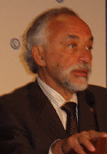Article
Real-time genotyping may be possible to establish correct warfarin dose
The first application of genetics to clinical practice in cardiovascular medicine may be imminent, said Jeffrey L. Anderson, MD, at a news conference here.
The first application of genetics to clinical practice in cardiovascular medicine may be imminent, said Jeffrey L. Anderson, MD, at a news conference today during the 2007 American College of Cardiology annual scientific session, here.
He showed that rapid genotyping to guide anticoagulation therapy in "real time" is feasible. Therefore, physicians may soon be able to adjust the critical first loading dose of warfarin and subsequent doses based on "in-office" genotyping, said Dr. Anderson, associate chief of cardiology at LDS Hospital, and professor of internal medicine, University of Utah, Salt Lake City.
Inter-individual variability in the response to warfarin is partly influenced by polymorphisms in the cytochrome P450 2C9 (CYP2C9) and vitamin K epoxide reductase complex subunit 1 (VKORC1) gene, he said. The wide variation in response to warfarin means that, at present, dosing must be done on a trial-and-error basis, with the risk of over-anticoagulating patients until the appropriate dose is found.
In his clinic, 72% of patients have at least one of the three genetic variants identified to influence warfarin response that requires modest reductions in warfarin dosing, Dr. Anderson said.
Extracting DNA from a buccal swab, polymorphisms in the CYP2CP*2 and *3 and the VKORC1 genes were identified using rapid profiling (average turn-around time: 68 minutes). Results were compared with sequencing.
He found 100% concordance between rapid genotyping and sequencing for the VKORC1 gene variant in 139 samples, and 99% agreement between the two methods for variants in the CYP2C9*2 and CYP2C9*3 genes in 140 samples.
"To my knowledge, this is the first broad application of genetics to cardiovascular medical practice," he said.
A large clinical study is needed to compare the effects of rapid genotyping with standard practice on the percentage of warfarin recipients who have International Normalized Ratios outside the therapeutic window.

Douglas P. Zipes, MD, (left) moderator of the news conference and emeritus director, cardiology division, Indiana University, Indianapolis, said the next 5 years should be an exciting time for genetic-driven cardiovascular medicine, acknowledging the many syndromes in cardiology that have a genetic basis, such as Brugada syndrome and long QT syndrome.





